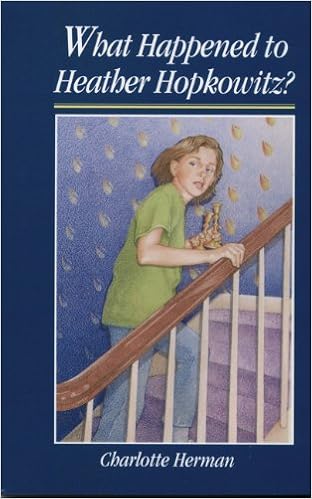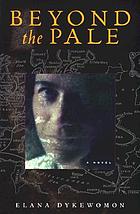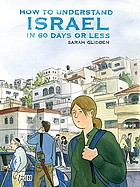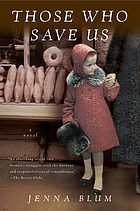Tagged with jews
In the Unlikely Event
author gender:
book type:
medium:
recommendation:
Lost Synagogues of Manhattan, Including Shuls from Staten Island and Governors Island, the
The third in Ms. Levitt's series of "lost" synagogues of New York's five boroughs focuses quite a bit on buildings in my neighborhood that formerly housed Jewish congregations. I've lived in three Manhattan zip codes (and one in Brooklyn, if you're curious, 11222). My current 10002 has 22, the one I lived in the longest, 10009 has 14, and the other, 10003 has 4. Levitt covers 32 others, as well, but to me, the book is primarily a Lower East Side party. Most of the buildings she describes in my neighborhoods are familiar, though I wouldn't have guessed that many of them had once been shuls.
author gender:
book type:
medium:
Make Me a Woman
Vanessa Davis is only about ten years younger than me, but reading her memoir comics and sketches I felt like a youth culture voyeur, sort of like I did when I watched the Girls pilot, featuring characters closer to twenty years my junior. Davis was 26-32 when she drew the comics collected here, so maybe my reaction isn't too far-fetched. Anyway, that's not to say that I didn't like her work, not at all! I just felt a little distant from it. Some of the issues, feelings and experiences rang true for me, but as in "I get it," rather than "I feel that."
author gender:
book type:
medium:
recommendation:
Bedwetter: Stories of Courage, Redemption, and Pee, the
"At first glance you might find the above [diary entry] interesting but that's because it's me, and you obviously find me interesting enough to read this book."
"Another nice thing about the Jews is that their rabbis don't make a habit of sexually violating their youngest and most vulnerable congregants. Of course, there are obvious reasons for this. For one thing, Jewish clergy are allowed to fuck and masturbate and marry. The first two of these activities work amazingly well for relieving sexual tension. … Oh, also, the Jewish clergy are allowed to have vaginas. As a general rule for any large organization, if you're looking to reduce the rape-iness of it, try hiring more women."
"I have comic friends who are gay. Some remain in the closet, and I don't blame them. It's not just out of fear of prejudice--it's fear of the gay community taking ownership of them. Suddenly, they are a gay comic, saddled with responsibility to represent."
"Please make this book be finished. I'll be honest: I kind of blew it off." from the Afterword, by God, quoting Silverman.
author gender:
medium:
Data, a Love Story: How I Gamed Online Dating to Meet My Match
Amy Webb, a journalist and serious data geek decides she's going to meet her husband through JDate. After a few bad dates she realizes that it's going to take more than posting snippets from her résumé into her profile and responding to invitations from whatever guy seems cool to find her beshert, so she launches an obsessive data gathering operation, which ultimately works.
author gender:
medium:
Beyond the Pale
This is such a Rivington Street readalike that it’s hard not to compare the two. Both begin in Russia around the turn of the 20th century and move to the Lower East Side after a pogrom. Both are about young Jewish female union workers and both have lesbian characters, and both depict the Triangle Shirtwaist Factory fire.
“You sound like a capitalist, all excited about machinery,” I said. “Aren’t you afraid that [linotype] will put printers out of work?”
“I was, but now I understand that the more books and pamphlets there are, the more men will read.” He dropped his voice. “And with this machine, we can make up our own pamphlets when the boss is out and melt the evidence before he comes back.” He leaned back in the sunlight, very pleased with himself.
The Williamsburg Bridge was its own sin. Its construction, Lena told me, made hundreds of people homeless when their buildings were torn down. A little like pogrom of progress, burning anything in its path, making Jews take to the roads with everything they owned on their backs, or move in with their relatives and landslayt, crowding more than we were ever crowded in Kishinev.
author gender:
book type:
medium:
recommendation:
How to Understand Israel in 60 Days or Less
Political progressive Sarah Glidden takes part in a Birthright Israel trip, riddled with doubt and concern, and after having researched Israel and Palestine extensively in the 40 days (heh) prior to her departure. Her graphic novel style memoir or the experience is nuanced, self-aware, self-critical, and brave. She arrives in Israel braced against being brainwashed and proving her Pakistani boyfriend’s father right that all American Jews eventually support Israel.
"Or maybe I don’t really feel this connection. Maybe it’s just impossible not to, after someone talks to you about holocaust refugees and teenaged soldiers!" p.104
Strip of a marker on floor of where Orthodox Jew Yigal Amir assassinated Yitzhak Rabin that says “murderer,” p. 106.
I haven’t been able to find an image of it online, but if there truly is such a marker on the site of the assassination, it’s indicative of the Israeli personality, to immortalize the actor of the aggression.
"Are those Palestinian boys yelling at us or just "playing?
I suddenly want to be back inside a homey Jerusalem cafe talking about the city’s culture clash instead of wandering around inside it.
[seeing a play] "I feel relaxed. The seats are comfortable; it’s dry and warm in here against the cold rain outside. But my ease in here goes beyond that.
"Almost everyone in this room is Jewish. Many of them are young. They like intellectual theater which means they probably like contemporary art and translated novels.
"They live in Israel, I don’t. They understand what is happening in this play, I don’t. But we probably have so much in common. I’m ashamed to admit to myself that I like this feeling of being in this room. I'm even more ashamed at how much I didn’t like being outside of it."
p. 191-92
author gender:
medium:
recommendation:
Those Who Save Us
This is a lovely and often moving story of a German-American mother and daughter. The former is trying to ignore her deeds good and not-so-good in Weimar, Germany before and during World War II, and the latter, a historian, trying to discover and understand her mother's generation's experiences and behaviors in the Nazi regime. The story goes back and forth between daughter Trudy's modern day interview project and mother Anna's youthful struggles with love and providing for her daughter.






